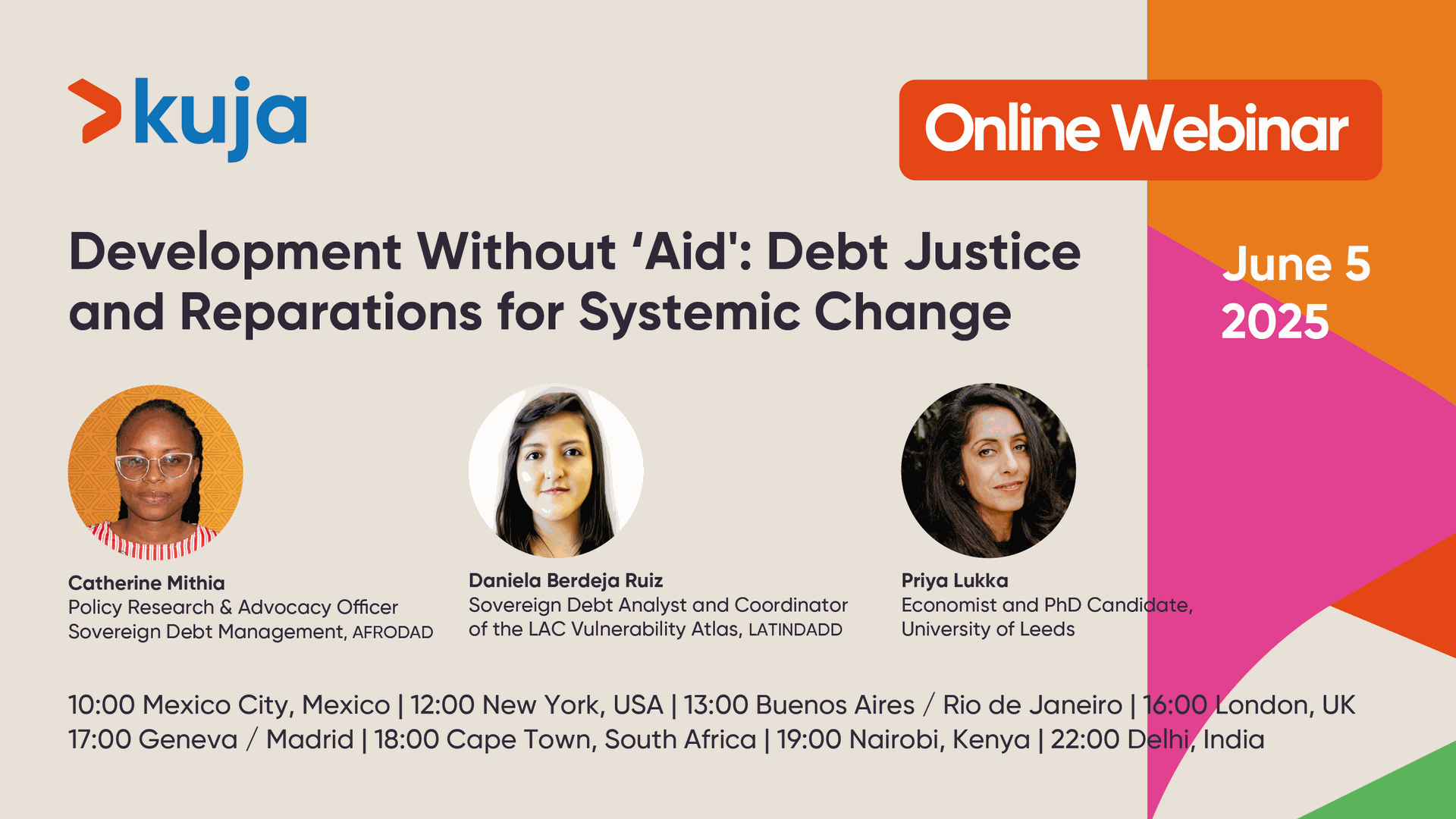On June 5, 2025, Kuja hosted a groundbreaking webinar titled Development Without ‘Aid’: Debt Justice and Reparations for Systemic Change. The conversation couldn't have been more timely. As traditional development aid faces growing scrutiny, activists and experts from Africa, Latin America, and beyond gathered to explore bold alternatives: debt cancellation, reparations, and the deep restructuring of the global financial system.
Here’s what we learned and why these conversations matter now more than ever.
The Global Debt Trap: A New Colonialism?
Priya Lukka, an economist and PhD candidate at the University of Leeds, opened the session by painting a stark picture of the global debt crisis. Her message was clear: Debt isn’t just a financial issue, it’s a tool of modern colonialism.
Countries across the Global South are trapped in cycles of debt, often borrowing just to survive while facing harsh conditions from lenders like the IMF and World Bank. These loan terms frequently demand that governments cut social spending, privatize public services, and deregulate their economies. The result? Deepening poverty, worsening inequality, and shrinking fiscal space for essentials like healthcare, education, and climate action.
Lukka underscored a chilling fact: Global South nations now spend far more on repaying debts than on social services. In many cases, debt repayments are 9 times higher than healthcare spending, 13 times higher than social protection, and 32 times greater than their climate change budgets.
And it doesn’t stop there. The very countries suffering most from climate disasters are often punished by credit rating agencies for being “climate vulnerable,” raising borrowing costs even higher, despite the fact that historical polluters bear most responsibility for today’s climate crisis.
For Lukka, reparations and debt cancellation aren’t just about financial relief. They’re about justice, sovereignty, and repairing the centuries-long legacies of colonialism, slavery, and environmental destruction.
Africa’s Debt Crisis: A Deeply Rooted Injustice
Catherine Mithia from AFRODAD (African Forum and Network on Debt and Development) brought the focus to Africa’s specific experience with debt.
Mithia walked us through the historical roots of Africa’s debt crisis, tracing it back to colonial economies built solely for resource extraction. Even after independence, African nations inherited massive debts, often to finance infrastructure that only served colonial interests. These debts, many of which were odious in nature, laid the foundation for today’s structural dependency.
In the 1980s and 90s, the infamous Structural Adjustment Programs (SAPs) imposed by the IMF and World Bank forced African governments to cut spending, privatize industries, and liberalize trade all in the name of “reform.” The result was mass job losses, reduced public services, and deepened poverty.
Though some debts were cancelled in the early 2000s, many African nations are once again heavily indebted, this time to private creditors and new lenders like China. High-interest loans and complex financial instruments are creating a new wave of debt distress.
Mithia emphasized that Africa’s debt crisis is not just about numbers, it’s about structural injustice. Reparations, she argued, offer a framework for acknowledging this historical exploitation and creating a more equitable, people-centric development model. She also called for systemic reforms, including a new UN Framework Convention on Debt to ensure fair lending, responsible borrowing, and transparent restructuring.
Latin America: Lessons from a Region in Perpetual Crisis
Daniela Berdeja Ruiz from the Latin America Network for Economic, Social and Climate Justice (LATINDADD) shared Latin America’s perspective, highlighting both similarities and key differences with Africa’s experience.
Like Africa, Latin America’s debt crisis has deep colonial roots and has been worsened by neoliberal policies. The region has suffered recurring debt crises since the 1980s, driven by heavy borrowing, falling commodity prices, and unfair global financial rules.
Berdeja Ruiz stressed that Latin American countries need permanent, fair mechanisms to resolve debt crises, ones that prioritize human rights and development over creditor profits. LATINDADD is also pushing for climate-linked debt relief, as many countries are trapped between repaying debt and coping with devastating climate impacts.
Her message was clear: structural change isn’t optional—it’s necessary for survival.
How Can You Get Involved?
One common question arose during the webinar: How can ordinary people engage in these complex issues?
Here’s what the speakers recommended:
- Start locally: Follow your country’s debt debates, especially during budget season. Ask why your government borrows, who benefits, and who loses out.
- Join movements: Many grassroots and regional campaigns are pushing for debt justice, climate reparations, and financial reform. Seek them out and support their work.
- Advocate for global change: Demand reforms at the UN, World Bank, and IMF. Speak up for fair debt rules and climate reparations, especially in the lead-up to major international conferences.
- Educate yourself: Learning more about how debt, climate, and inequality are connected is itself an act of resistance. Start with resources from AFRODAD, LATINDADD, and the speakers’ organizations.
The Bottom Line: We Need Systemic Change
This webinar was a powerful reminder that debt justice isn’t about charity, it’s about power, fairness, and dignity. True development must be rooted in justice, not dependency. That means debt cancellation, reparations, and rethinking how the entire global financial system works.
As Catherine Mithia put it: Africa must be a rule-maker, not just a rule-taker.
The message is clear: The time for cosmetic reforms is over. We need bold, systemic change and that change begins with us.
Watch webinar recording here.
